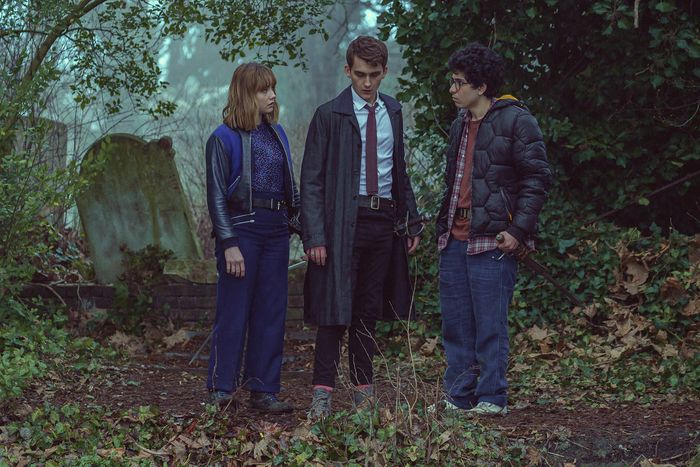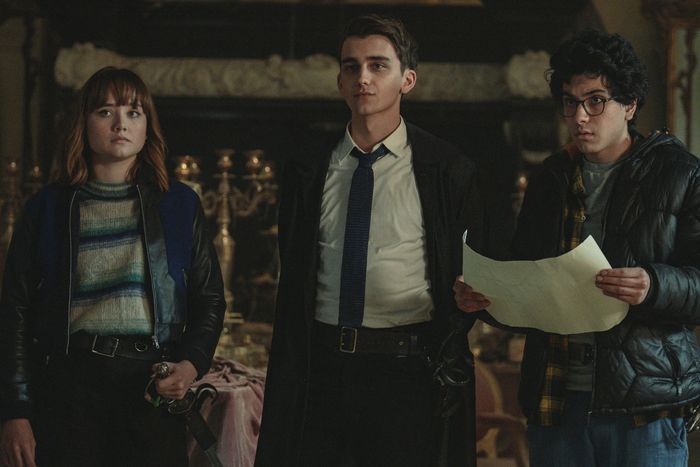
Spoilers follow for the first season of Netflix’s Lockwood & Co.
In “This Will Be Us,” the first episode of Joe Cornish’s Netflix series Lockwood & Co., 13-year-old Lucy (Ruby Stokes) sits in a drab office, her gaze unfocused as her mother (Sandra Huggett) and her future employer Mr. Jacobs (Andrew Woodall) discuss her contract. The world is decades into a ghost pandemic, with undead spirits floating amok at night, trapping people into comalike “ghost lock” with eye contact, and killing them with one touch. Only teenagers who reveal extrasensory abilities are strong enough to fight the ghosts, or “visitors,” and they work for agencies that underbid one another for jobs and send their young employees out on dangerous missions. If there’s something strange in your neighborhood, call the child soldiers.
There’s no power attached to these gifts, no real social or financial capital. During the job interview, Mr. Jacobs patronizingly tells Lucy to smile, while her mother ensures she’ll receive Lucy’s salary for detecting and destroying ghosts and the objects that tie them to this plane. The two adults breeze through the fact that it will be Lucy’s responsibility to “safeguard herself at all times,” and ignore the monument outside Mr. Jacobs’s office dedicated to the dozens of teens from their small town who have died in service to agencies like his. “Everyone’s scared all the time. What makes you so special?” Lucy’s mother scoffs when her daughter shares her fear; she prefers pocketing Lucy’s wages to protecting her child. The ghosts aren’t the enemies in the stylishly designed and smartly written Lockwood & Co. It’s the adults as bad bosses and abusive employers, and in his first TV series, Cornish has crafted a coming-of-age narrative that stands in for a kind of class war.
With his first film, 2011’s Attack the Block, Cornish drew comparisons to the ’80s oeuvre of Steven Spielberg, with whom he worked on The Adventures of Tintin; many times has this viral tweet about kids killing aliens with hammers been reshared with a One Perfect Shot–style joke tying together Attack the Block and Spielberg’s E.T.: The Extra Terrestrial. But what has become more clear in the years since that John Boyega–starring cult hit about teens defending their South London neighborhood from invading extraterrestrials is that Cornish’s cinematic mind-set owes a debt to teen whisperer John Hughes, too. Cornish uses the sci-fi and horror genres — the aliens of Attack the Block, the medieval world of The Kid Who Would be King, and the ghosts of Lockwood & Co. — as a gateway to explore how teens feel, what they’re scared of and what they yearn for, and how they want to prove themselves to their friends and comrades in arms. These stories consistently center adolescent emotion as a driving force of action, and Attack the Block and The Kid Who Would Be King employed an implied binary in which adults were either intimidating or irrelevant. With Lockwood & Co., Cornish makes that elder-youth divide explicit, and weights it with confrontational commentary.
The Cornish cinematic universe is full of latchkey working-class kids figuring out, on their own, how to fill their after-school and weekend hours while their parents toil to keep them afloat, and instead of offering support or protection, police, teachers, and other guardians usually occupy accusatory and antagonistic roles. There isn’t a ton of intergenerational trust in Cornish’s filmography, and that’s because it hasn’t been earned. Think of how Boyega’s Moses characterizes the government’s reaction to aliens killing Black and POC teens in Attack the Block — “They don’t care, man” — and how cops will later blame him for the murders. As creator, showrunner, and writer-director of the premiere and finale episodes, Cornish sharpens that characterization in Lockwood & Co., in which adults get rich off the life-threatening exertion of children. In Hughes’s film The Breakfast Club, the teens stuck in weekend detention agreed that when you grow up, your heart dies; in Lockwood & Co., Cornish pushes that statement to its figurative extreme, and puts it under a financial lens. Against the dispassionate greed of wealth-hoarding, resource-churning grown-ups, Lockwood & Co. argues that the anti-authoritarianism of adolescence is actually society’s most valuable asset.
Adapted from the first two books in Jonathan Stroud’s same-named series, Lockwood & Co. is set in a present-day alternate reality. Fifty years ago, a mysterious event caused “the Problem,” or the materialization of ghosts all around the world. The series’ title credits are a collage of newspaper headlines and animated graphics that give a condensed history, including information about a mandatory nighttime curfew; the efficacy of iron, silver, and salt as weapons; and the emergence of heightened teens. For a few years, these adolescents can see spectral matter, hear whispers and voices, and otherwise sense ghosts, giving rise to a new economy of paranormal agencies. A lengthy depression has gripped the U.K., and an agency post is guaranteed income, but per the rules of the Department of Psychical Research and Control (DEPRAC), the teens are almost always legally required to work with an adult supervisor. And when those bosses abandon their employees to ghosts so they can save themselves, the courts frequently side with the former, like when Mr. Jacobs leaves Lucy and her friends to die and lies to a believing judge about what happened, protecting his own reputation and smearing Lucy’s. When Lucy’s mother slaps her daughter for defending herself and commands her to beg Mr. Jacobs for her job back, it’s Lockwood & Co. establishing its true central conflict as the one between adults and teens. There’s a system of control here, and it only goes one way.
Lockwood & Co. magics up various scenarios to showcase all angles of that intractability, and to evoke real-life struggles between the powerful and the powerless. Lucy runs away to London, where she fails to progress at one job interview after another because she lacks the right paperwork to reflect her skills (see: the “brain waste” of migrant labor). She lands a job with A.J. Lockwood & Co. Investigators, a teen-run company that, quite unusually, is accredited to operate without adult supervision, and subsequently targeted by DEPRAC agents for the audacity of making money for themselves and cited for seemingly trivial infractions (see: police harassment and corruption). She’s shocked to learn how casually children are misused in the criminal underground: In the episode “Mesmerised,” she faces off against a married couple who sell stolen relics that radiate the pain humans experienced before coming back as ghosts, and who do business with buyers who use child “canaries” to feel the agony attached to the items and judge their authenticity. And as she helps colleagues Anthony Lockwood (Cameron Chapman) and George Karim (Ali Hadji-Heshmati) pursue new clients, she sees how quickly money-based threats are leveraged when adults want to keep the trio in line. DEPRAC Inspector Barnes (Ivanno Jeremiah) holds a 60,000-pound fine over their heads to get them to stop investigating a murder. A multimillionaire who made his fortune off creating the iron chains used to capture ghosts significantly lowballs the team on a job that others have died on — and then, for good measure, tries to murder them, partially so he won’t have to honor their contract.
There is no recourse for Lucy, Lockwood, and George when they’re wronged by the adults who have set up a new world order that lets them hide behind layers of government and capitalist protection. Protection for their industry is scarce; the families of ghost-shocked teens in packed hospital wards receive payouts from a philanthropic fund, but there’s no public discourse about how to make the industry safer, or better provide for teens who age out of their abilities and are then left jobless and defenseless. Insurance is mandatory for the small agencies, but can be revoked at any moment; retirement is impossible to imagine because agents rarely live that long. “It’s terrible the world’s come to this. I feel sorry for your generation,” says an older woman who hires Lockwood and his team, but her pity doesn’t extend to the teens when they nearly die fighting a more-powerful-than-anticipated ghost and accidentally burn down her house. For that, the woman who misled Lucy, Lockwood, and George about how serious her paranormal problem really was refuses to pay her bill.
In advertising Lockwood & Co., Netflix identifies the titular agency’s primary antagonists as “their corporate rivals,” an allusion to the top-tier Fittes Agency that wins the most profitable contracts, owns a gigantic headquarters in downtown London, and boasts a sprawling collection of priceless artifacts. There certainly is friction between the top Fittes Agency team, led by company star Quill Kipps (Jack Bandeira), and Lockwood, who dared to compete against them. But describing Lockwood & Co. as a series primarily about adolescent infighting is a misread of how deliberate Cornish and his collaborators are in suggesting that solidarity and camaraderie among the teens (and literal unionizing, which George suggests) is the only way to push back against the age-based imbalance forced upon them.
“Maybe you should leave it to the adults before somebody dies,” Inspector Barnes says to Lockwood, but decades of that hierarchy haven’t accomplished much for the teens conditioned to fight against instead of alongside each other. Only when these disparate groups come together do they achieve any kind of significant success against those pulling their strings. When Lockwood, Lucy, and George join efforts with Quill and his team (including The Kid Who Would Be King alumna Rhianna Dorris) in finale “Not the Eternal,” they are able defeat a baddie who intended to sacrifice kids to help reanimate her master. But that visitor is basically an afterthought for Cornish, who spends far more time in the episode tracking myriad manipulative and murderous grown-ups and their schemes against the teens who they both encumber and exploit. In Lockwood & Co., the undead are never as damaging as the living.
The first season of Lockwood & Co. is streaming on Netflix.



